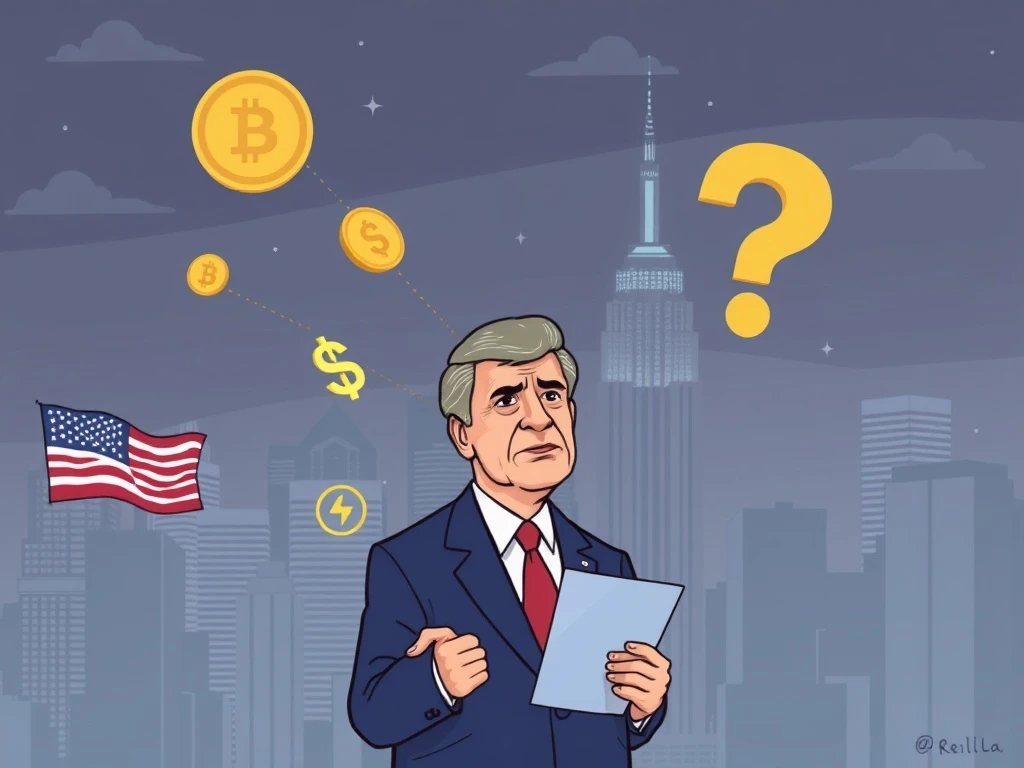Zohran Mamdani’s Shock Win: What Does it Mean for New York Crypto?

Zohran Mamdani’s recent primary election victory has sent ripples through New York’s political landscape, particularly within the city’s burgeoning crypto industry. For those invested in the future of digital assets in the Big Apple, the question looms: what could a Mamdani mayoralty mean for New York crypto?
Zohran Mamdani’s Stance on Crypto Regulation
Following Mamdani’s win, prominent figures in the crypto space voiced concerns. Gemini co-founder Tyler Winklevoss criticized New York City’s governance, while tech investor David Sacks drew parallels to collectivism, urging Silicon Valley to pay attention to NYC politics.
However, despite laying out a progressive policy platform, Mamdani has said little specifically about cryptocurrency. His most notable public comments on the subject came in 2023, following major industry collapses like Terra and FTX. At that time, as a member of the New York City Assembly, he expressed agreement with the New York Attorney General’s call for more consumer protections within the stablecoin industry. This stance was common among lawmakers and regulators across the spectrum during that period, reflecting widespread concerns about investor losses.
Mamdani also critiqued his primary opponent, Andrew Cuomo, for advising crypto exchange OKX during an SEC probe, highlighting concerns over compliance and anti-money laundering laws. While focused on consumer safety and regulatory adherence, these statements are far from outlining a comprehensive approach to crypto regulation in the city.
In contrast, the current NYC mayor, Eric Adams, has actively promoted New York as a potential crypto hub, making pro-crypto statements and exploring blockchain initiatives. Despite these efforts, many industry participants feel Adams’s administration has had limited tangible impact on making NYC a leading crypto center.
The Limits of the NYC Mayor’s Power Over New York Crypto
Understanding the potential impact of Zohran Mamdani requires examining the actual power of the mayor’s office over the crypto industry. While the mayor influences municipal taxes, licensing, and city-level projects, direct oversight and regulation of financial services, including cryptocurrency businesses, primarily rest with state-level authorities.
Key regulatory bodies influencing New York crypto include:
- New York Department of Financial Services (NYDFS): Responsible for the BitLicense, a stringent licensing requirement for virtual currency businesses operating in the state.
- New York Attorney General: Has taken enforcement actions against crypto companies for issues ranging from fraud to lack of registration.
Even with a mayor actively promoting crypto, like Eric Adams, the city’s financial industry must primarily comply with state regulations. The BitLicense, while criticized by some, has not prevented many crypto companies from seeking to operate in New York, suggesting the state regulatory environment, more than city policy, dictates access.
Therefore, even if Mamdani sought to implement policies unfavorable to the industry, his direct power over core crypto regulation would be limited. Significant changes would likely require coordination with state regulators or legislative action at the state level.
Navigating NYC Politics: Industry Response
Given the high probability of Mamdani winning the general election against Eric Adams, the crypto industry is considering its next steps. Some industry figures, like Tyler Winklevoss, have hinted at supporting candidates who might oppose Mamdani.
However, another strategy could involve engaging with Mamdani’s campaign or administration. As one crypto lawyer suggested, demonstrating a willingness to compromise on certain issues and potentially contributing to his campaign could influence his stance towards a more neutral, or even favorable, position on New York crypto.
It’s also worth noting that Mamdani faces significant challenges beyond the crypto industry’s concerns. His progressive platform, including policies on immigration, has drawn criticism from national figures like former President Donald Trump, who has made false claims about Mamdani’s immigration status. Such high-profile political battles may occupy much of his attention, potentially leaving crypto as a lower priority issue.
Conclusion: Uncertainty and Adaptation for New York Crypto
Zohran Mamdani’s victory in the primary signals a potential shift in NYC politics. While his limited public statements on crypto have caused apprehension among some industry leaders, his focus appears to be on consumer protection and regulatory compliance, themes not entirely alien to ongoing national discussions about crypto regulation.
Crucially, the direct influence of the NYC mayor over the state-regulated crypto industry is constrained. Companies operating in New York will continue to navigate the requirements set by the NYDFS and the Attorney General, regardless of who holds the mayoral office.
The future relationship between Zohran Mamdani and the New York crypto industry remains uncertain. The industry’s ability to engage constructively and Mamdani’s focus once in office will likely determine the path forward, but the fundamental regulatory landscape in New York is shaped more at the state level than by city hall alone.







